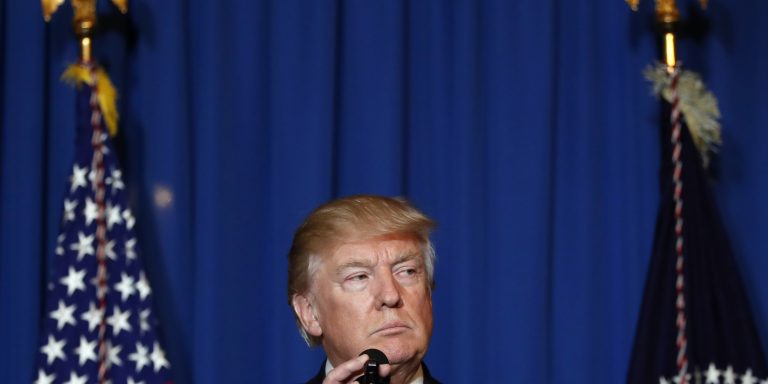INTELBRIEF
April 13, 2018
IntelBrief: A Coalition of the Tweeting

- President Trump’s contradictory tweets on a possible U.S. military strike in Syria highlight an overall inconsistency in foreign policy.
- Trump first warned Russia to ‘get ready’ because missiles would be coming; the next day he tweeted an attack could be ‘very soon or not so soon at all.’
- Such public statements are at odds with the deliberative process of decision making by the National Security Council, which in these cases, presents the President with various options.
- Such erratic and brash statements also make building a needed coalition of military and diplomatic partners much more problematic.
.
The United States’ reaction to the latest chemical weapons attack by the Assad regime in Syria has been marked by taunting tweets by President Trump, indicating a retaliatory strike was imminent. Behind the scenes, the U.S. military and diplomatic corps were working quietly to build a coalition of countries, which included France and Britain, to respond comprehensively to the Assad regime’s war crimes. These disjointed responses highlight a disconnect between the chief executive and the executive branch he leads.
On April 11, President Trump tweeted a direct warning to Russia. The tweet was in response to comments made by the Russian ambassador to Lebanon, who stated that incoming U.S. missiles to Syria ‘and their source’—meaning U.S. planes or ships—could be targeted. President Trump tweeted: ‘Russia vows to shoot down any and all missiles fired at Syria. Get ready Russia, because they will be coming, nice and new and “smart!” You shouldn’t be partners with a Gas Killing Animal who kills his people and enjoys it!’
Aside from telegraphing possible military operations—something Trump had criticized the Obama administration for doing in the past—the offhand and flippant nature of the comments puts the President and his administration in a difficult position. The U.S. now might feel compelled to act militarily because it does not want to walk away from such a high-profile statement. Conflicts have foolishly and tragically started because countries wanted to ‘save face.’
President Trump has already had to walk a warning that missiles ‘will be coming’ to Syria with an April 11 tweet that directly contradicted his earlier tweet. Trump tweeted ‘Never said when an attack on Syria would take place. Could be very soon or not so soon at all!’ He then went on to add that the U.S. has ‘done a great job ridding the region of ISIS. Where is our ‘Thank you America?’ Such contradictory statements make building an effective coalition to seriously address the ongoing Syrian catastrophe even more difficult than it already was. There have been few if any moments of unified action by the West in dealing with Syria.
Turning the outrage over the latest war crime by the Russian and Iranian-supported Assad regime into an appropriate and effectual response was never going to be easy, but the public statements by President Trump could give leaders pause before committing their countries to an effort led by the U.S. France and Britain are still considering if they will join a military operation—with the larger question of what happens after the missiles fly still unanswered. Germany has already stated it will not participate, with Chancellor Merkel telling reporters on April 12 that ‘Germany will not take part in possible military action.’
.
For tailored research and analysis, please contact: info@thesoufancenter.org
[video width="960" height="540" mp4="https://thesoufancenter.org/wp-content/uploads/2018/04/Final-Edit-1-172.mp4" poster="https://thesoufancenter.org/wp-content/uploads/2018/04/AP_17097071175872.jpg"][/video]